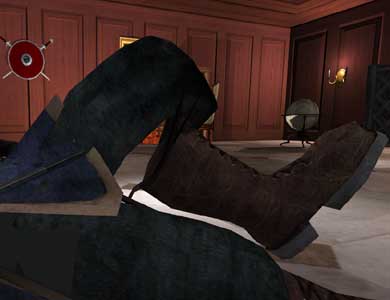Advanced Character Rigging - Part Two
Advanced Character Rigging with Maya 7.0
Part Two
Back to Advanced character rigging Introduction
Skip to Advanced Character Rigging - Part Three
Now it's time to "skin" the bones.
All of the meshes need to:
- be triangulated (F3 (Modeling mode), Maya menu - Polygons > Triangulate)
- have their histories deleted (Maya menu - Edit > Delete by Type > History)
- have their transformations frozen (Maya menu - Modify > Freeze Transformations)
- face the X-Axis (Z-Axis when adding full body ik for animation)

Next we'll need to attach those meshes to the skeleton rig. In the outliner window (Maya menu - Window > Outliner . . ., select all the meshes & the skeleton (hold Ctrl while clicking the meshes & the skeleton):

Then Edit > Select Hierarchy:

This is necessary to include all of the joints in the skeleton. The origin joint would be the only joint we rig & that wouldn't be too much fun, now would it?
And now hit F2 for Animation Mode. Go to the menu Skin > Bind Skin > Smooth Bind [ ] & click the square to the right of the menu item:

which will bring up the bind skin options:

& use those values.
Now select a mesh, in this case we'll select the legs since the upper legs & the lower legs are tricky to weight. When the lower leg rotates back, you want it to look natural. Not to have it look like this:

Now bring up the Paint Skin Weights tool (Maya menu - Skin > Edit Smooth Skin > Paint Skin Weights Tool [ ] & click the square to the right. The Paint Skin Weights Tool will replace the Attribute Editor & the mesh will become black (black has no weights associated with the selected joint in the Paint Skin Weights Tool, white is fully weighted) :

I hate having stray joints rigged especially when the joint isn't all that important. So the Flood function is very handy to get rid of those stray weights. Select the Hip joint in the weight painter, select the Replace function, turn up the weight value to one, & click "Flood" like so:

Which will make the legs white:
(they are now all connected to the Hip joint--Springheel)

Now select an upper leg joint in the weight painter (the middle window on the Paint Skin Tool window), in this case it's "LeftUpLeg",leave the weight value as one, select a brush at the top of the weight painter, & paint on the mesh where the upper left leg should be (notice that the rest of the leg turned black after choosing another joint in the weight painter, that's a blank canvas for the joint you selected):
When you paint, remember that you're painting the vertices. Each vert that you paint will be moved when that joint is moved. The more white a vert is, the more it will move when that joint is moved--Springheel.

Keep painting weights wherever they should go & we'll troubleshoot & refine the weighting in part three which is way over here: